The broad ranging effects of globalism will be a common theme explored this fall by several Assembly Series speakers, including social activist and film star Mia Farrow. WUSTL’s annual speaker series has brought a variety of voices to campus since 1953.
This year’s fall semester lineup features prominent humanitarians as well as two distinguished WUSTL alumni, one of which — a graduate of both the College of Arts & Sciences and the School of Law — kicks off the Assembly Series.
All Assembly Series programs are free and open to the public. However, some events may have limited public seating.
The fall 2010 schedule follows; check the website frequently for changes and updates to the schedule at assemblyseries.wustl.edu. The website also includes ways to sign up for reminders, receive updates and find other information sources about featured speakers.
Arsalan Iftikhar, JD, “The Pacifist Fundamentalist,” 7 p.m. Sept. 13, College Hall, WUSTL Residential Area (South 40)
Iftikhar (AB ’99, JD ’03), an international human rights lawyer, prominent political commentator and author of the popular blog TheMuslimGuy.com, will explore some of the themes found in the novel, The Reluctant Fundamentalist by Mosin Hamid, which is this year’s reading selection for the Freshman Reading Program. The event is co-sponsored by the First Year Center and the School of Law.
When it comes to presenting the “Islamic” voice in American media, Iftikhar notes the tendency of media to play to exaggerated statements of an intolerant few instead of presenting the tolerant, moderate majority voice. Since the attacks of 9/11, Iftikhar has been battling this tendency, trying to dispel the falsehoods of the uninformed and extremist few who find the spotlight.
Iftikhar majored in political science in Arts & Sciences as an undergraduate at WUSTL. He once gave an interview on NPR and said, “Even though I was born 30 years ago, in many ways, my life only truly began at 8:46 a.m. Eastern Standard Time on Sept. 11, 2001. Because as an American Muslim, that was the day that my country was attacked by people who would also infamously hijack my religion.”
For almost 10 years, his thoughtful, empathetic and balanced insights have presented a genuine Muslim voice that counterbalances the extreme stereotypes so often on display in contemporary American culture.
In addition to his widespread media presence, Iftikhar also is a contributing editor for Islamica magazine and is the author of the forthcoming book Islamic Pacificism: Confessions of a Muslim Gandhi, scheduled for publication in January 2011.
For more information on The Reluctant Fundamentalist or the Freshman Reading Program, visit the website at frp.wustl.edu/.
Matthew Bishop, “Philanthrocapitalism,” 6 p.m. Sept. 16, May Auditorium, Simon Hall
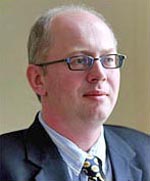
In this era of financial morass, is it odd that “mega-giving” is thriving? Not according to Bishop, who, with co-author Michael Green, has coined the term “philanthrocapitalism.”
As the recent pledges made by billionaires demonstrate, the concept of using a person’s wealth, business savvy and influence to address the world’s gravest ills has taken a firm hold on our collective psyche, and it will only grow stronger.
Bishop is the U.S. business editor and New York bureau chief of The Economist and author of many books. His talk is sponsored by the Skandalaris Center for Entrepreneurial Studies.
Kevin Washburn, “Improving Criminal Justice for American Indians,” noon Sept. 23, Bryan Cave Moot Courtroom, Anheuser-Busch Hall
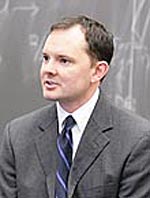 Washburn
Washburn
As a citizen of the Chickasaw Nation of Oklahoma, Washburn has experienced firsthand racial disparities.
He uses his legal expertise to help develop law policy on behalf of Native Americans, such as the Tribal Law and Order Act, recently signed by President Barack Obama, which bolsters justice resources for reservations.
Washburn also is one of the country’s leading experts on gaming law. Co-sponsors of Washburn’s presentation are the School of Law, the Kathryn M. Buder Center for American Indian Studies at the Georgy Warren Brown School of Social Work, and the Native American Law Student Association.
Jonathan Safran Foer, reading and commentary, 7 p.m. Sept. 30, Steinberg Auditorium, Steinberg Hall
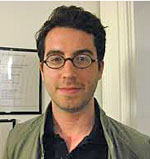
Foer is widely regarded as one of the most important and most unconventional writers of our time. Hailed by many critics as a work of genius, his first novel, Everything Is Illuminated, was published when he was 25.
It was followed by another critically acclaimed novel, Extremely Loud and Incredibly Close, in 2005. His most recent work, the nonfiction Eating Animals, is an account of his personal journey toward vegetarianism.
Foer’s reading and commentary is a Neureuther Library Lecture, and is co-sponsored by the University Libraries, the Campus Store and Mortar Board honor society.
Nicholas Kristof, “Half the Sky: From Oppression to Opportunity for Women Worldwide,” 4 p.m. Oct. 4, Graham Chapel
In his search to shed light on the profound challenges those living in underdeveloped countries must endure, Kristof frequently has placed himself in danger.
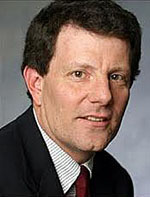
Despite the atrocities he has witnessed, the two-time Pulitzer Prize-winning op-ed columnist for The New York Times and co-author of Half the Sky: Turning Oppression Into Opportunity for Women Worldwide, remains committed to giving a voice to the most vulnerable.
Kristof’s talk will be this year’s Youngdahl Lecture; co-sponsors include the Brown School, the School of Law, the Association of Women Faculty, and Women, Gender, & Sexuality Studies in Arts & Sciences.
Cynthia Enloe, 4 p.m. Oct. 8, Steinberg Hall Auditorium
As Enloe’s research has shown, the effects of globalization on women are vastly different from that of men.
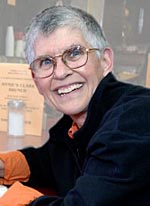 Enloe
Enloe
Enloe has traveled the globe, talking to women about their everyday lives and analyzing their situations from a distinct feminist perspective. In her many books, Enloe, who teaches at Clark University, exposes the human side of what it means to be female in a global economy.
She is this year’s Spencer T. Olin Fellows lecturer.
Adam Ross, reading and commentary, 7 p.m. Oct. 19, Women’s Building Formal Lounge
Although Ross’ debut novel, Mr. Peanut, bagged the No. 1 spot on the Huffington Post’s “best summer beach reads” list, it’s anything but lightweight.
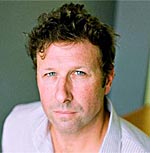
Ross (MFAW ’94) uses a murder investigation as a way to create a sophisticated, complex, funny and brutally honest rumination on the institution of marriage. Stephen King put it best when he called Mr. Peanut “the most riveting look at the dark side of marriage since Who’s Afraid of Virginia Woolf?”
Ross’ reading and discussion is a Neureuther Library Lecture, and is co-sponsored by the University Libraries and the Writing Program in Arts & Sciences.
Colette Avital, 11 a.m. Oct. 22, location to be announced
The former deputy speaker of the Knesset and former Israeli ambassador has dedicated her career to the service of Israel, to which she emigrated from Romania in 1950. Elected to the 15th Knesset in 1999 as a member of the Labour Party, she served for three legislative terms.
She was instrumental in creating a committee that located and restored stolen assets of Holocaust victims.
Avital’s appearance is sponsored by Students for a Peaceful Palestinian and Israeli Future.
Mott Greene, “Alfred Wegener and The Origins of Modern Earth Science in the Theory of Continental Drift,” 4 p.m. Nov. 3, location to be announced

With the sophisticated methods now available to scientists, it is interesting to think about how great discoveries were made a century ago. Greene, a geologist and MacArthur Fellow, has done just that.
In a soon-to-be-published book Alfred Wegener: Life and Scientific Work, Greene examines the work of Wegener, the first earth scientist to recognize the importance of using data from other disciplines. Greene believes this widening of focus was key to Wegener’s discovery of continental drift. This presentation is the Thomas Hall Lecture in the History of Science.
Marianne Hirsch, 4 p.m. Nov. 8, Graham Chapel
Iconic images of the horrors of the Holocaust are a part of our culture’s collective memory.
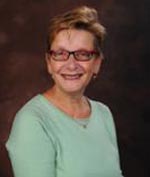 Hirsch
Hirsch
Hirsch studies the ways in which these images became part of one’s unconscious understanding of the world and how the past is processed and remembered.
Hirsch’s most recent book, Ghosts of Home: The Afterlife of Czernowitz in Jewish Memory, co-authored with Leo Spitzer, offers a profound analysis of memory’s echo across generations.
Hirsch will deliver this year’s Holocaust Memorial Lecture.
Jonathan Zimmerman, “Beyond Bedrooms and Borders: What a Historian of American Sex Education Learned by Looking Overseas,” 5 p.m. Nov. 11, Women’s Building Formal Lounge

As Zimmerman often notes in his books, op-ed pieces and blogs, the classroom always has been the battleground for America’s culture wars.
Although the Scopes trial occurred nearly a century ago, the fight over teaching evolution in the classroom, as well as the ongoing conflicts over prayer, sex education and which “side” gets to tell the story of America in its textbooks is as fervent as ever.
Zimmerman’s solution? Teach all sides of a cultural issue. His talk is presented by the Phi Alpha Theta history honorary.
Mia Farrow, 5 p.m. Nov. 17, Graham Chapel
The acclaimed actress also is a devoted humanitarian who advocates for African children devastated by armed conflict and civil unrest.
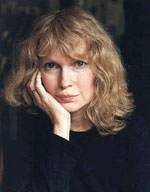
As a UNICEF goodwill ambassador, Farrow has helped raise awareness and funds for the millions of children caught in the middle of violent clashes in such countries as Chad, Uganda and Sudan. For her compassion and service, Farrow was recognized in 2008 as one of the most influential people in the world by Time magazine.
This is the annual Elliott Stein Lecture in Ethics.
Van Jones, “Beyond Green Jobs: The Next American Economy,” noon Nov. 30, Graham Chapel
As he outlines in his 2008 best seller, The Green Collar Economy: How One Solution Can Fix Our Two Biggest Problems, the leading environmentalist believes America’s economic restoration lies in the development of clean energy.
The former special adviser to President Obama and founder of Green for All has been profiled in Time magazine’s “100 Most Influential People” (2009) and in its 2008 issue featuring “Environmental Heroes.”
The program is co-sponsored by Green Action, Law & Culture Initiative, Energy & Environmental Law Society and the Black Law Student Association.
The Assembly Series continues next semester. Look for the new schedule to appear on the website in late January 2011.
For more information on Assembly Series programs, visit assemblyseries.wustl.edu or call (314) 935-4620.